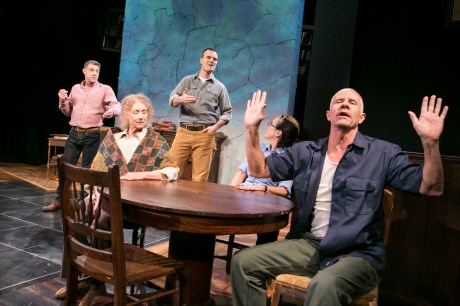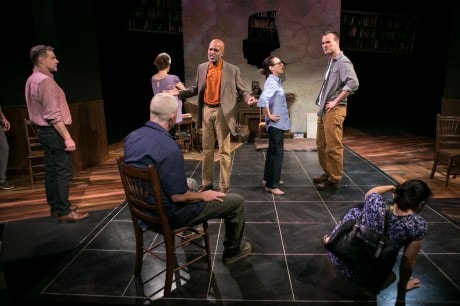This is a big play,” the playwright Tony Kushner has said without understatement, and without an argument from anyone. It’s sprawling and sweeping and awesome in depth and breadth. It’s also long, about three and a half loquacious hours, with a title so discursive it has been foreshortened to “iHo.” But as Director John Vreeke’s epically eloquent production just opened at Theater J demonstrates, absolutely nothing else about it needs to be abbreviated.

Kushner’s story centers on an Italian-American family in Brooklyn with radical intellection in its blood. It’s one of those homes where talk overlaps constantly and opinions ping-pong and agile vocabularies are obligatory; and though other people come and go, their brains all seem networked to the same cognitive cloud. That, of course, would be the prodigious mind of Kushner. The upshot is that drop-in visitors such as ourselves, inquisitive theatergoers, cannot help but be amused and amazed. Even if we don’t catch it all, there’s more than plenty to entertain us. And as we listen in on the brilliant badinage, our own mental faculties are quickened.
The genius of Kushner’s writing in The Intelligent Homosexual’s Guide… is that it activates in its audience the very attentiveness it wants and needs us to have in order to tune in to what it says and means—a mentally transformative experience unlike most any other in live theater. What lies in store for the rapt receiver is a story with such a broadband of resonance you’d have to combine Chekhov and Shaw with a soupçon of Simon to come up with anything close.
On one level iHo centers on Gus, the widowed 72-year-old father of two sons, one gay and one straight, and a daughter, who is divorced from a man and in a lesbian relationship. Gus owns the $4 million brownstone where much of the play takes place. Gus has announced his intention to commit suicide, and his three children, who have their own dramas going on, are determined to change his mind. We know Gus means business because he’s already made a serious attempt. A former longshoreman and labor union organizer, he has become disillusioned with life, not in a morose and depressed way but in an insightful and astute way: The anticapitalist revolution he wanted to happen, and worked so hard to help incite, has not come to pass. Worse, he says, the world is dying because money has become truth.
There’s a bit of an implausibility about Gus: If he’s so smart, why can’t he think himself out of checking out? Well, just because, really. Besides, in Tom Wiggin’s compelling and persuasive performance, Gus’s idée fix propels interconnecting storylines that are as lively and fun to follow as they are dead serious.
The big ideas packed into iHo are about money, class, labor, property, the worth of work, the value of a human life—all loaded concepts in socialist and anticapitalist discourse—as well as about faith, the soul, God, and other spiritual concepts from religious traditions and theological study. Though Kushner’s full title seems an almost mocking amalgam of Marxist and religious frames of thought, it turns out he really does use both languages to dramatize and express his themes. Plus he throws in a lot of laughs and sex.
When the play begins, Gus’s gay son, known as Pill (the engagingly earnest Lou Liberatore), is on the phone with a hot but dim hustler, Eli (the appealingly ardent Josh Adams). We learn there’s an intense connection of eroticism and commerce between them, not to mention multiple betrayals—including of Pill’s husband, Paul—and as their complex sex-for-sale relationship evolves over the course of the play, Kushner glosses it with some of the play’s most eyeopening observations about the deleterious effect of money on human life and relations.
Similarly Kushner extracts from the narrative of Gus’s suicide planning a potent metaphor for the anathema of property. Unbeknownst to his kids, Gus has found a buyer for the brownstone. He intends to sell it before he kills himself so the money can be divided among the siblings, a notion that distresses and appalls them. The house hangs over their lives not only figuratively; Production Designer Misha Kachman has cleverly suspended over the stage a red brick brownstone facade that does so literally.
Money, property, and labor are also viewed through Kushner’s witty lens in the subplot of Gus’ daughter, called Empty (the energetic Susan Rome), whose very pregnant same-sex partner, Maeve (the droll Lisa Hodsoll), is about to give birth to the child they planned. Empty and Maeve’s relationship is on the rocks, however, again with multiple betrayals. Empty has sex with her ex, Adam (the slick James Whalen), a real estate agent who brokered the sale of the brownstone. The sperm for the baby did not come from a bank as planned because Pill borrowed the money they’d saved up to do that and spent it all on his young hustler. So Maeve used sperm from Empty and Pill’s brother, Vito (the stolid Tim Getman), making her pregnant with her own nephew but locking the baby into an inheritance claim. Sooze (the flighty Sue Jin Song), Vic’s wife, shows up. When she learns Vic delivered the semen to Maeve not as a hand job but in situ, she freaks. Thus does Kushner hilariously and provocatively weight Maeve’s impending labor with impropriety and property, monkeying around and money.
Meanwhile three of the characters extemporize in religious language. Paul (Michael Anthony Williams) is a lecturer in theology, Maeve is a doctor of theology, and Gus’s sister, Zeeko (Rena Cherry Brown), is a former nun. And a character who arrives late in the play, Shelle (Jenifer Belle Deal), brings a loving, personal, and profoundly moving dimension to all the talk of the value of life.
All the stage arts perfectly serve Kushner’s extraordinary script and Vreeke’s focused conception. We are ushered into the philosophical/political landscape of the play by a fascinating montage of images and audio evoking U.S. and European political protest, demonstrations, communist and socialist leaders and mass actions—all by Projections Designer Jared Mezzocchi and Composer/Sound Designer Eric Shimelonis. Similar effects, including by Lighting Designer Dan Covey, mark the play’s passage in time and place and bracket the play’s scenes. While Kachman has framed the realistically furnished playing areas with dramatic abstraction—a wide bookcase suspended askew, a vast cracked wall upstage, that hovering building facade—Costume Designer Ivania Stack has given the characters an unobtrusive commonality of credibility.
Any “intelligent theatergoer’s guide” to The Intelligent Homosexual’s Guide… ought to advise that there’s too much relational, emotional, and ideational content here to be appreciated and assimilated in one sitting. And the play lets you know right away that’s perfectly fine. There’s a lot of scintillating and quippy philosophizing, and the play moves at a brisk clip, but every plot point is unmissable and every character arc unmistakable. Whether you take a deep breath and call it The Intelligent Homosexual’s Guide to Capitalism and Socialism With a Key to the Scriptures or whether you breezily call it iHo, this show is a surfeit of surprise and substance, of significance and delight, of density and shimmering wit. And the long and the short of it is…don’t miss it.

Running Time: Approximately three hours and 20 minutes, with two 10-minute intermissions.
The Intelligent Homosexual’s Guide to Capitalism and Socialism With a Key to the Scriptures plays through December 21, 2014 at Theater J at The Washington DCJCC’s Aaron & Cecile Goldman Theater- 1529 16th Street, NW, (16th and Q Streets), in Washington, DC. For tickets, call the box office at (800) 494-8497, or purchase them online.




